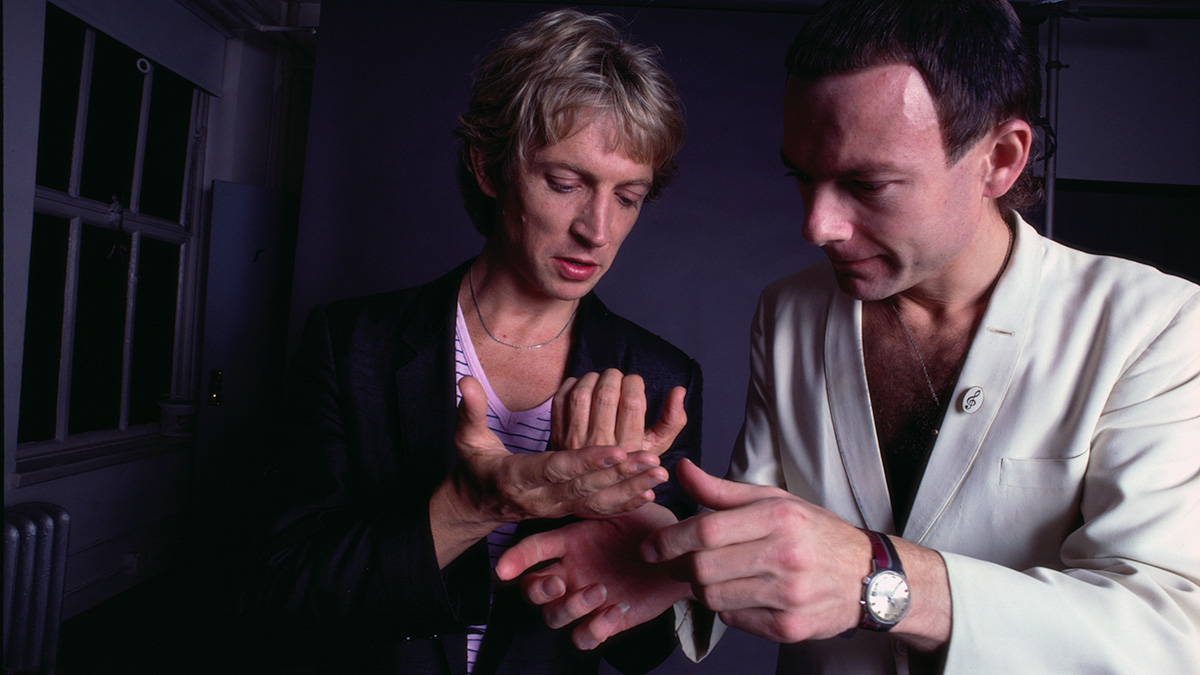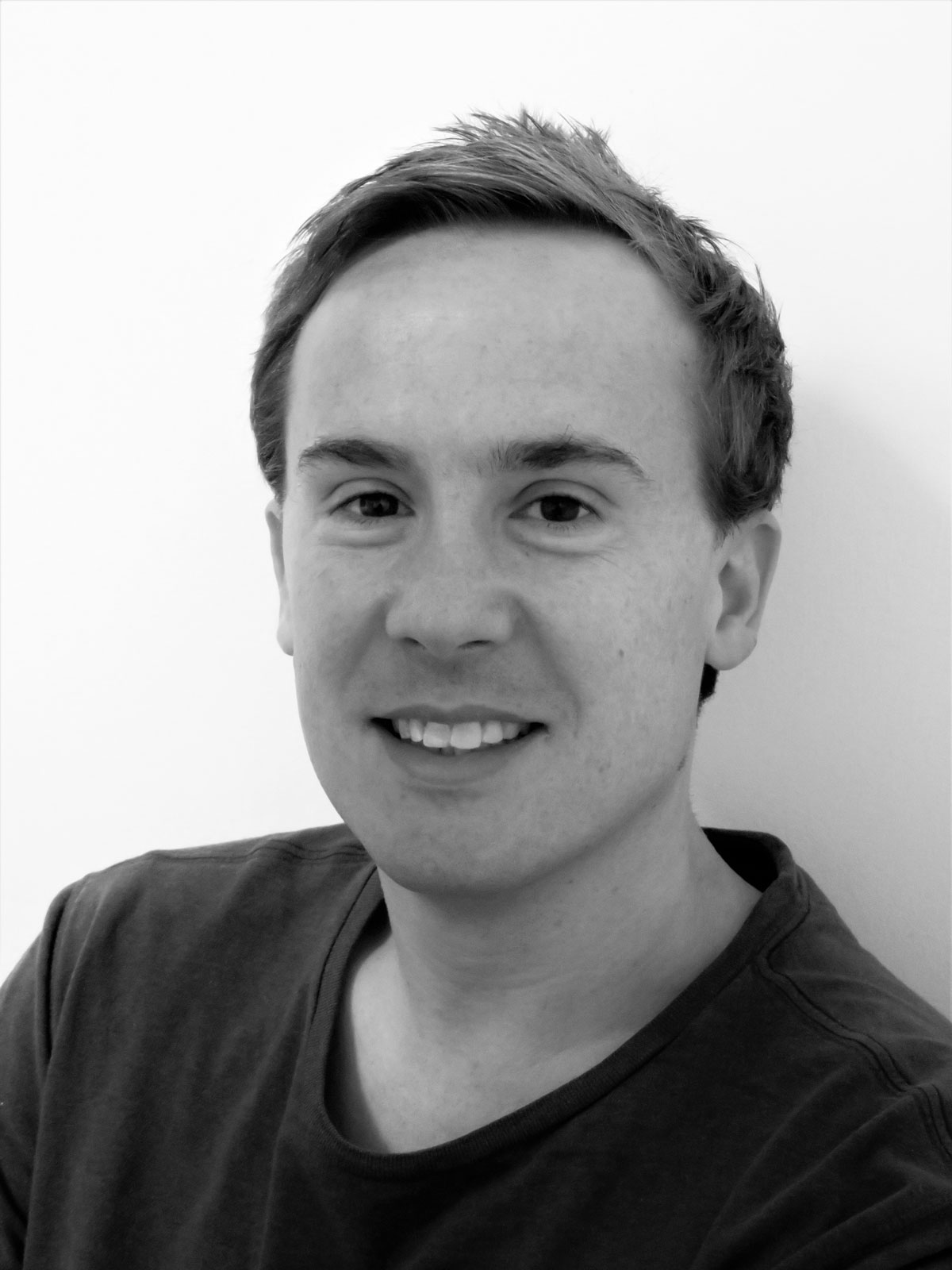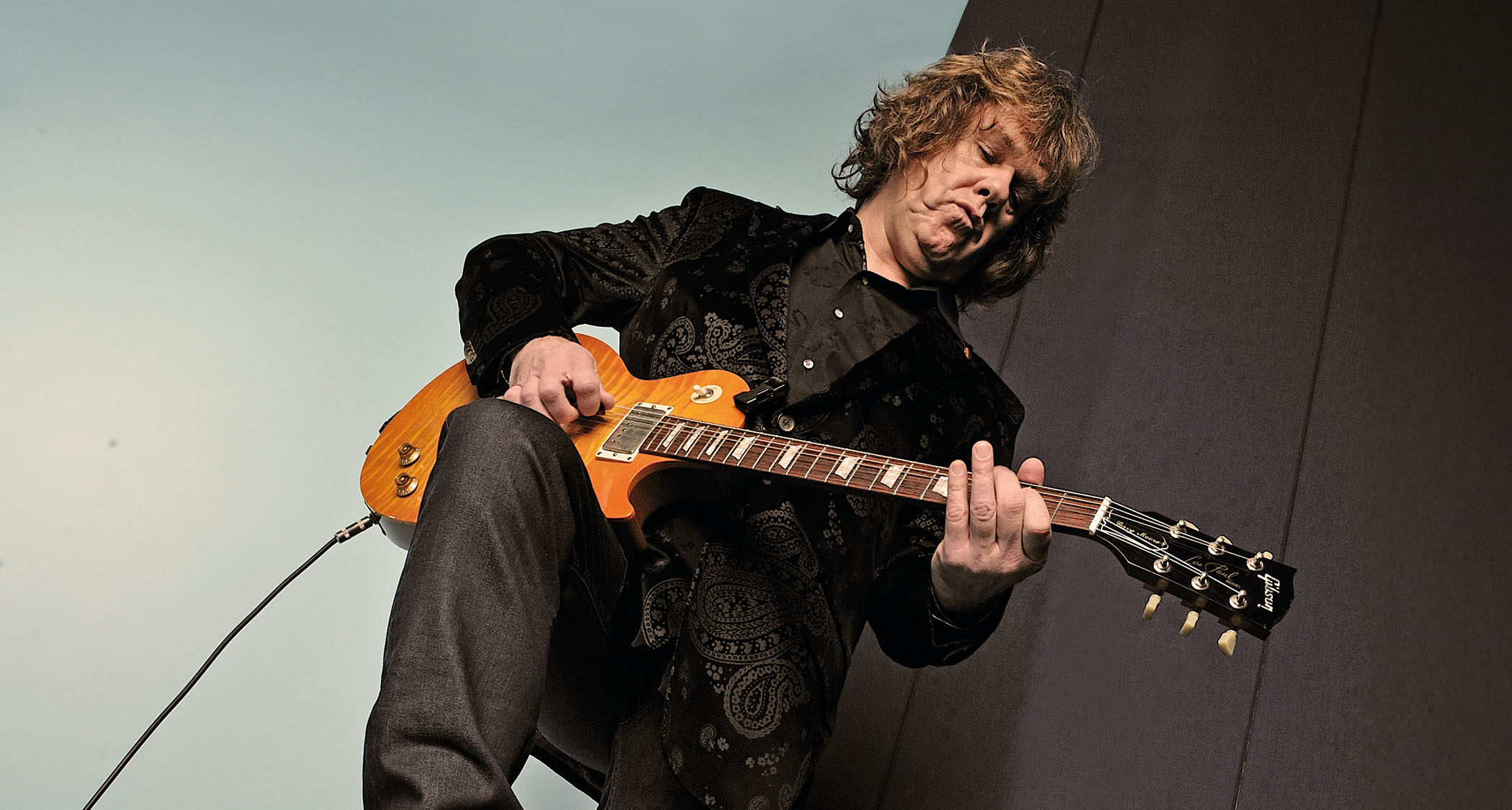“I subsequently became the world’s most famous guitarist with The Police. I wanted to play with somebody else to see how I’d do, like an experiment on myself”: At the height of his ’80s success, Andy Summers needed a challenge – he found Robert Fripp
As Summers’ and Fripp’s avant-garde albums of the 80s are reissued, we hear all about how the side-project came to be – and whether it could happen again

All the latest guitar news, interviews, lessons, reviews, deals and more, direct to your inbox!
You are now subscribed
Your newsletter sign-up was successful
Four decades later, it’s a pairing so strange you’re tempted to write it off as a fever dream. Yet the release of a new boxset comprising 1982’s I Advance Masked and 1984’s Bewitched albums – plus 11 unheard tracks from the vaults – confirms that Andy Summers and Robert Fripp really did join forces.
As star names from the disparate worlds of stadium rock and prog respectively, The Police and King Crimson guitarists also seemed poles apart as players.
But as Summers tells us, their fleeting, never-to-be-revisited collaboration pushed the envelope with its collision of jazz, ambient and world flavours.
What made you want to collaborate with Robert Fripp in the early 80s?
“Well, I wasn’t into King Crimson at all. Definitely not my kind of music. But Robert and I come from the same area of England. I was part of the Bournemouth music scene and you heard about this ‘weird kid’ out in Wimborne – and it was Robert Fripp because he has a certain style.”
“At 16, I got a job as a guitarist in a hotel band with some very stellar jazz musicians. I eventually left and went to London with Zoot Money – actually, I got fired for trying to pick up hotel girls – and Robert took over the ‘guitar seat’, let’s call it. So there’s a sort of cosmic connection there, I suppose.
“So years pass. I went to university in America, studied music, came back, was down and out, as it were, and had to get reconnected. And the person who reconnected me, strangely, was Robert. He gave me the number of a drummer, Mike Giles, who was just about to tour with Neil Sedaka, so I had a gig with him.
All the latest guitar news, interviews, lessons, reviews, deals and more, direct to your inbox!
“I subsequently became the world’s most famous guitarist with The Police. And being the kind of searching musician I am, I started looking around. I was starting to feel somewhat musically hemmed in by being in that band. I wanted to stretch my legs and play with somebody else, just to see how I’d do, almost like an experiment on myself.”
“At that time, Robert was living in New York and I was there all the time. So he popped into my mind: ‘Oh yeah, Robert Fripp, he’s a good guitarist. Maybe we could do something together.’ It started with a fairly casual hook-up, when we went to practise in a photographer’s flat in Soho.”
What were your impressions of Robert as a guitar player?
“You know, he plays the way he plays. It’s that multimeter, single-string style that he plays very well. You couldn’t say, ‘Oh man, let’s do a blues’ or ‘This thing is in 3/4’ or ‘Let’s make it more country.’ His thing is the polyrhythmic guitar lines. That’s what he does. He doesn’t really do anything else. He doesn’t play the blues. He’s never played the blues in his life. That’s not who he is.
“I’m a much broader guitarist. I saw that his style was going to be the anchor for whatever we did, and my job was going to be to somehow put the flesh on the bones, and see if we could make up an album’s worth of material. We sort of messed around for a couple of hours and said, ‘Yeah, it’ll be okay’. We got on very well. We were the usual ironic Englishmen, living in New York and laughing at it all.”
Where were the album sessions held?
“Well, another common link was an engineer back in Bournemouth, a guy called Tony Arnold. We were all in awe of him as kids because he had these incredible American guitars that nobody else had. So he was this giant figure that loomed over us.
We actually had a lot of fun doing it. We had to work it out, how to come up with this stuff. It wasn’t a question of guitar chops – we had that in abundance
“At this point, he’d started a recording studio in Bournemouth called Arny’s Shack. It was a little two-room joint, but Tony was absolutely immaculate in his setups, everything technical was top of the line. So we thought, ‘We’ll go and record there.’
“And we actually had a lot of fun doing it. We had to work it out, how to come up with this stuff. It wasn’t a question of guitar chops – we had that in abundance – but [the challenge] was to make some sort of imaginative album between the two of us that didn’t really sound like jazz or pop music, necessarily, but was reflective of the two characters doing the guitar playing.”
I Advance Masked is arguably the more avant-garde of the two albums. Why do you think you were so experimental outside of The Police?
“Well, I think my ears just always went there. As you go on and you mature and you’re interested in ‘real’ music, why are you going to stick with I-VI-IV-V?”
Fripp said Bewitched was “a lot more Andrew than it is me”. Is that your memory?
“Yeah, it’s true, to a point. You know, he is on every track. But he had to go on tour, so I finished the album and mixed it on my own. There was less of a full engagement, let’s say, between the two of us on Bewitched. The first album, it felt like we had something to prove: ‘Can we pull it off?’ And the second one, we went, ‘Well, we’ve got our style now.’ But it’s true: he couldn’t make all the sessions, so it was more or less left to me.”
What setup were you using in the studio?
“I think I had my JC-120 and Telecaster from The Police. Probably also a Stratocaster, a Les Paul and an acoustic of some sort. You know, a small battery. And my Pete Cornish pedalboard, which I obviously was very used to working with in The Police.
We also had this Yamaha drum machine – and neither Robert nor I could get it to work
“There’s some chorus on those albums – and the most fancy thing that was available in that period was the new Roland guitar synthesiser, which is in there somewhere. We also had this Yamaha drum machine – and neither Robert nor I could get it to work.”
What was the reaction to the two albums?
“The first one was a real success. It got into the Billboard Top 50, which, for the kind of music it was, was astonishing. I guess Robert was popular, and I was, like, mega. So a lot of notice was taken of it. I thought it was weird that it got that high in the American chart. Shocking, actually. But very encouraging.
“We never went on the road or anything. We never became a band. There never seemed to be time. You can imagine what it was like for me. Robert didn’t like screaming girls, either, so…”
Looking back on the experience, do you think you and Robert left a mark on each other’s guitar playing?
“I doubt that Robert would be interested in playing anything like me at all. Because I really came from jazz and blues, and then eventually rock. I was a very different player. And I got his thing, but I wasn’t interested in it, particularly.
“Of course I could play the lines – I had the technical facility to play anything. And that’s what, really, he would bring to every song. I couldn’t say, ‘Robert, why don’t you play some altered chords’; that wasn’t his thing. He would play the way he would play and we would fit around it.
“But it was all fairly congenial. We weren’t, like, fighting or arguing over it. It was such an odd setup, with two rather disparate guitarists, but it worked. Out of that difficulty, it made something very good.”
The two original albums are being reissued along with a disc of bonus material. How did that come to light?
I mean, Robert’s out there doing his… I don’t know how you describe that stuff he does with his wife. He’s become like a one-man cover band
“I got this call about three years ago. I had all the two-inch tapes in a storehouse in Los Angeles. Who knew what was on them? No-one. But all these other tracks turned up, which were surprisingly good.
“So I’m pleased to see this come out because there’s some material that we didn’t even know about, and it all seems to have held up quite well. They’re a really weird couple of records. Not necessarily by today’s standards; things have moved on. Maybe we were ahead of our time.”
Would you consider reconnecting with Robert to make more of this music?
“It felt like it was enough. I would not be against it. Robert would have to approach me. Let’s see if [this reissue] stirs anything up. I mean, Robert’s out there doing his… I don’t know how you describe that stuff he does with his wife. He’s become like a one-man cover band. So I don’t know, knowing him, if he’d be up for anything like that. It’d have to be very good. But I wouldn’t necessarily categorically say no.”
- This article first appeared in Guitarist. Subscribe and save.
- Complete Recordings 1981 - 1984 is out now via Panegyric.
Henry Yates is a freelance journalist who has written about music for titles including The Guardian, Telegraph, NME, Classic Rock, Guitarist, Total Guitar and Metal Hammer. He is the author of Walter Trout's official biography, Rescued From Reality, a talking head on Times Radio and an interviewer who has spoken to Brian May, Jimmy Page, Ozzy Osbourne, Ronnie Wood, Dave Grohl and many more. As a guitarist with three decades' experience, he mostly plays a Fender Telecaster and Gibson Les Paul.
You must confirm your public display name before commenting
Please logout and then login again, you will then be prompted to enter your display name.







